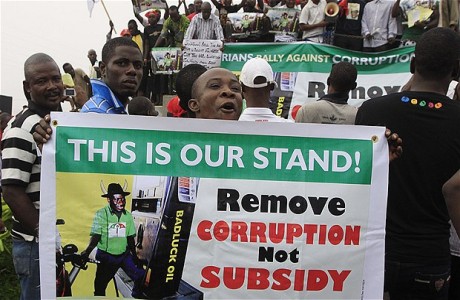Nigerian President Goodluck Jonathan has announced a cut in petrol prices in a bid to end a nationwide strike now in its second week, as soldiers seized the main protest site in Lagos.
Mr Jonathan made the announcement in a televised national address after a week that saw him remain largely silent in public as the strike and mass protests shut down Africa’s most populous nation and largest oil producer.
The president’s announcement that prices would be slashed by around 30 per cent came after last-minute talks had failed to resolve the dispute.
He said the protests had been “hijacked” by those seeking to promote “discord, anarchy and insecurity”.
Unions have vowed to press ahead with the strike, although they said they were calling off street protests due to security concerns voiced by Mr Jonathan.
“Government will continue to pursue full deregulation of the downstream petroleum sector,” he said in his address.
“However, given the hardships being suffered by Nigerians, and after due consideration and consultations with state governors and the leadership of the National Assembly, government has approved the reduction of the pump price of petrol to 97 naira ($0.60) per litre.”
The government ended fuel subsidies on January 1, causing petrol prices to more than double from 65 naira per litre to 140 naira or more, sparking the strike and protests that began on January 9.
Most people live on less than $2 a day.
Soldiers set up roadblocks at key points in Lagos for the first time since the protests began, while demonstrators could not enter the park where they have been gathering for the past week as troops took it over.
Nigeria Labour Congress chief Abdulwahed Omar said Mr Jonathan spoke of “serious security reports” indicating that those from outside organised labour may try to hijack protests.
“We came to a conclusion that we will stay at home, that is stay off the streets, in order to make sure that we don’t in the first instance endanger innocent lives because of the security situation in the country,” Mr Omar said.
Asked if the strike would continue, he said: “Yes, but we have suspended the street protests.”
Nigeria has faced spiralling violence, most of it in the country’s north and blamed on Islamist group Boko Haram, prompting warnings of a wider religious conflict, including from some who have evoked the possibility of civil war.
But the main fuel protests in major cities, including Lagos, have been largely peaceful, although at least 15 people are believed to have been killed in various incidents.
Government officials and economists had said removing subsidies was essential and would allow much of the $8 billion a year in savings to be ploughed into projects to improve the country’s woefully inadequate infrastructure.
But Nigerians were united in anger against the scrapping of subsidies, which they viewed as their only benefit from the nation’s oil wealth.



